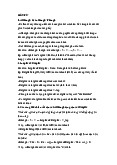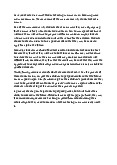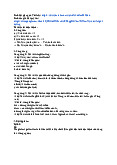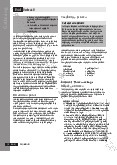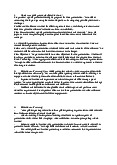



Preview text:
ÔN TẬP ĐẢO NGỮ
EX1: Choose the best answer
1. No sooner___________ out than it rained. a. did I go b. I went c. had I gone d. I had gone 2. Often___________ a meeting. a. do we have b. we do have c. have we d. we have
3. So old ___________ that she couldn't dance. a. She wasn't b. she was c. wasn't she d. was she
4. On the battle field___________ a. the tanks did lie b. the tanks lay
c. did the tanks lie d. lay the tanks
5. At no time___________ greater opportunities. a. did women had
b. has women had c. does women have d. have women had
6. Never before___________ in an carnest attempt to resolve their differences.
a. have the leaders of these two countries met
b. the leaders of these two countries have met
c. have the leaders of these two countries meet
d. met the leaders of these two countries
7. Not only the child, but also the grandparents___________ a. is joining b. joins c. were joining d. has joined
8. Not only__________ at the post office, ___________ at the grocery store.
a. does Mary work/but she also works
b. works Mary/but she also works
c. does Mary work/but does she also work d. had entered she
9. No sooner___________ the house than the phone started to ring.
a. had she entered b. she had entered c. entered she d. had entered she
10. Only by saving money___________ a house. a. he buys b. he can buy c. can he buy d. buy she
11. Over there___________ the shop that sells souvenirs. a. is b. are c. has d. have 12. Nowhere else___________ a. they can go b. can they go c. they can't go d. can't they go
13. On a hill in front of them___________ a great castle. a. standing b. stand c. to stand d. stood
14. "Is this machine often in need of repair?"
"No, ___________ problems to arise". a. Seldom don't we expect b. We expect seldom c. Seldom we expect d. Seldom do we expect
15. Only during the early twentieth century___________ in the United States. a. liquor was prohibited then b. that liquor was prohibited c. when liquor was prohibited d. was liquor prohibited
16. Only when the ground is kept moist___________ germinate. a. grass seeds will
b. will grass seeds c. grass seeds does d. does grass seeds
17. Not until Columbs discovered America___________ to Europe. a. was bananas brought b. bananas were brought c. were bananas brought d. bananas was brought
18. _______ but also it filters out harmful rays.
A. The environment gives us air to breathe
B. Not only the environment gives us air to breathe
C. The environment which gives us air to breathe
D. Not only does the environment give us air to breathe
19. Only after the food has been dried or canned_______.
A. that it should be stored for later consumption
B. should be stored for later consumption
C. should it be stored for later consumption
D. it should be stored for later consumption
20. _______had he entered the office than he realized that he had left his wallet at home. a. Hardly b. Scarcely c. No sooner d. Not only
21. It was not until she had arrived home______her appointment with the doctor. a. When she remembered b. That she remembered c. And she remembered d. Did she remember
It was not until + mđ/cụm thời gian.. + that + mđ trong quá khứ: mãi đến tận….thì
22. Not until Andrew stopped smoking____healthy again
a. Did he feel b. that he started to feel c. then he felt d. that he did feel
EX2: Choose the best answer
1. She had only just begun to speak when people started interrupting.
A. She hardly had begun to speak when people started interrupting.
B. Hardly she had begun to speak when people started interrupting.
C. Hardly had she begun to speak when people started interrupting.
D. She hadn’t begun to speak when people started interrupting.
2. We arrived at the airport. We realized our passports were still at home.
A. It was until we arrived at the airport that we realize our passports were still at home.
B. We arrived at the airport and realized that our passports are still at home.
C. Not until had we arrived at the airport, we realized our passports were still at home.
D. Not until we arrived at the airport did we realize that our passports were still at home.
3. The plane had taken off. Paul realized he was on the wrong flight.
A. Hardly had Paul realized he was on the wrong flight when the plane took off.
B. It was not until the plane had taken off, did Paul realize he was on the wrong flight.
C. Not until the plane had taken off did Paul realize he was on the wrong flight.
D. No sooner had the plane taken off than Paul had realized he was on the wrong flight.
4. It was only when I left home that I realized how much my family meant to me.
A. As soon as I left home, I found out what a family could do without.
B. I left home and didn’t realize how meaningful my family was.
C. Not until I left home did I realize how much my family meant to me.
D. Before I left home, I realized how much my family meant to me.
5. We had no sooner got to know our neighbors than they moved away.
A. Soon after we got to know our neighbors, we stopped having contact with them.
B. If our new neighbors had stayed longer, we would have got to know them better.
C. Once we had got used to our new neighbors, they moved somewhere else.
D. Hardly had we become acquainted with our new neighbors when they went somewhere else to live.
6. They had such a fierce dog that nobody would visit them.
A. So fierce was their dog that nobody would visit them.
B. Their dog was fierce enough for anybody to visit them.
C. If their dog weren’t fierce, somebody would visit them.
D. So fierce a dog did they had that nobody would visit them.
7. You can stay in the flat for free as long as you pay the bills.
A. Whether you pay the bills or stay in the flat, it is free.
B. Without the bills paid, you can stay in the free flat.
C. Unless the flat is free of bills, you cannot stay in it.
D. Provided you pay the bills, you can stay in the flat for free.
8. No sooner had she put the telephone down than her boss rang back.
A. Hardly she had hung up, she rang her boss immediately.
B. Scarcely had she put the telephone down when her boss rang back.
C. She had hardly put the telephone down without her boss rang back.
D. As soon as her boss rang back, she put down the telephone.
9. I left home. Then I realized how much my family meant to me.
A. Not until I had left home did I realize how much my family meant to me.
B. When having left home did I realized how much my family meant to me.
C. After having left home did I realized how much my family meant to me.
D. Only when I realized how much my family meant to me did I leave home.
10. We survived that accident because we were wearing our seat belts.
A. Had we not been wearing our seat belts, we wouldn't have survived that accident.
B. But for our seat belts, we would have survived that accident.
C. If we weren't wearing our seat belts, we couldn't have survived that accident.
D. Without our seat belts, we could have survived that accident.
